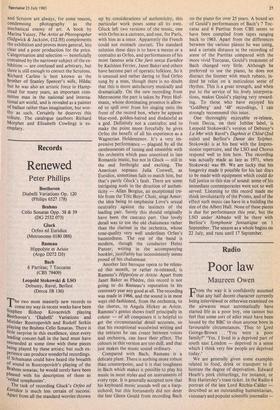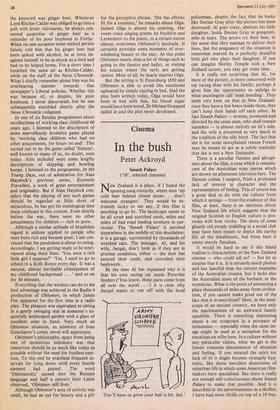Radio
Poor law
Maureen Owen
From the way it is confidently assumed that any half decent character currently being interviewed or otherwise examined on the airwaves must automatically have started life as a poor boy, one cannot but feel that some sort of edict must have been issued by the BBC to shun anyone born in favourable circumstances. Thus to Lord George-Brown ... 'You were a poor family?"Yes. I lived in a deprived part of south east London — deprived in a sense which I think very few people are deprived today.'
We are generally given some examples related to food, drink or transport to il- lustrate the degree of deprivation. Edward Heath's pork chitterlings, for instance, or Roy Hattersley's tram ticket. In the Radio 4 portrait of the late Lord Ritchie-Calder described as an outstanding humanitarian, visionary and popular scientific journalist —
the keyword was ginger beer. Whenever Lord Ritchie-Calder was obliged to go into a pub with lesser visionaries, he always con- sumed quantities of ginger beer as a reminder of his poor boyhood in Forfar. When on one occasion some wicked person falsely told him that his ginger beer had been spiked with alcohol, he at once im- agined himself to be as drunk as a lord and had to be helped home. For a short time I breathed the same air as Ritchie-Calder, while on the staff of the News Chronicle. What I chiefly remember about him was his overbearing manner towards that newspaper's Liberal policies. Whether this was because of, or despite, his poor boyhood, I never discovered, but he was subsequently ennobled shortly after the News Chronicle collapsed.
In one of six Sunday programmes about recollections of working-class childhood 60 years ago, I listened to the description of some marvellously inventive game played by 'working class children who had no other amusements, for hours on end'. This turned out to be the game called 'Statues', well known to many of us, no doubt, even today. Also included were some lengthy descriptions of skipping and bowling hoops. I listened to the programme, In My Young Days, out of admiration for Alan Haydock's previous series, Eccentric Travellers, a work of great entertainment and originality. But if Alan Haydock con- siders that the playing of any such games should be regarded as little short of miraculous, he has got his sociological time warp confused in this context. Even shortly before the war, there were no other amusements for children — rich or poor.
Although a similar attitude of breathless regard is seldom applied to people who were born rich and became poor, I am con- vinced that the pendulum is about to swing. Accordingly, I am getting ready to be inter- viewed along these lines: 'You were a rich little girl I suppose?"Yes. I used to go to school in a Rolls Royce every day. It was a natural, almost inevitable consequence of my childhood background ... ' and so on for 30 minutes.
Everything that the wireless can do to the best advantage was achieved in the Radio 4 production of Oblomov, in which James Fox appeared for the first time in a radio play. The pleasure was equivalent to sitting in a gently swinging seat in someone's ex- quisitely landscaped garden with a glass of excellent wine to hand. Very much an Oblomov situation, as admirers of Ivan Goncharov's comic novel will appreciate.
Oblomov's philosophy, apart from being one of monstrous indolence was that tomorrow should be as much like today as possible without the need for fruitless exer- tion. To this end he practised frequent in- tervals for lying down until every hostile element had passed. The word 'Oblomovitis' passed into the Russian language and half a century later Lenin observed, 'Oblomov still lives.'
Although Oblomov's area of activity was small, he had an eye for beauty and a gift for the perceptive phrase. 'She has elbows fit for a countess,' he remarks about Olga. Indeed Olga is almost his undoing. Her sweet voice singing poems by Pushkin and Lermontov to the piano, to a certain extent almost overcomes Oblomov's lassitude. It certainly provides some moments of over- whelming beauty to the play. At this point Oblomov nearly does a lot of things such as going to the theatre and ballet, or visiting his estates where the serfs are getting restive. Most of all, he nearly marries Olga.
But the setting is St Petersburg 1850 and Oblomov is able to avoid this emotional upheaval by simply staying in bed. Had the play been written today, Olga would have been in bed with him, his blood sugar would have been tested, Dr Miriam Stoppard called in and the plot never developed.







































 Previous page
Previous page